Maternal healthcare in Ghana, particularly in rural areas, faces significant challenges. In many communities, access to quality maternal and antenatal care is limited. Pregnant women often have to travel long distances to receive medical attention. However, innovative solutions like BabyChecker are beginning to make a profound impact, helping bridge the gap in access to maternal and antenatal care in rural Ghana.
In a recent interview, we spoke with Mary Otofa, a dedicated midwife working in the Mount Kwazi CHIPS zone, a rural area with a population of around 2,000. Mary shared her experiences and insights into the daily realities of providing maternal and antenatal care in a challenging environment and how BabyChecker, provided by the TREATS Association, has become a necessary part of her work.
The Reality of Maternal Care in Rural Ghana
Mary’s journey into midwifery was driven by a passion for women’s health. After initially training as a nurse, her desire to provide better care for pregnant women led her to pursue a diploma and later a degree in midwifery. Today, she is a key healthcare provider in her community, offering a range of services from antenatal to postnatal care.
Despite her dedication, the challenges are immense. “Ghana is not advanced in this area,” Mary explained. “We still have areas where there is no midwife to care for pregnant mothers, and they have to travel far to access healthcare.” The government is making efforts by establishing small clinics, known as CHIPS compounds, in communities to provide primary care. However, these facilities often lack the necessary logistics and equipment to adequately care for expectant mothers.
Traditionally, Mary and other midwives in similar settings relied on a fetoscope to monitor pregnancies—a method that is limited in its ability to detect potential complications. However, with the introduction of BabyChecker, an Artificial Intelligence (AI) that analyses obstetric ultrasound to identify potential risks, Mary’s scope of care has expanded significantly.

The Impact of BabyChecker in Mount Kwazi
BabyChecker has been a game-changer for Mary and her patients. “Before, we used the fetoscope, which could not detect any abnormality—just the foetal heart rate. But now, with BabyChecker, we can see so much more,” Mary noted. The device allows her to assess risks, such as the position of the placenta, and determine if a referral to a larger facility is necessary.
One powerful example Mary shared involved two women in her community whose scans with BabyChecker revealed a low placenta, a condition that can lead to serious complications during delivery. “We sent them to a bigger facility, and a caesarean section was performed for them. So, I think this introduction to BabyChecker is very, very good. If we carry on with it and then upgrade it, it will help the centre very well,” she affirmed.
Moreover, BabyChecker has also eased the logistical burdens of providing care in a rural setting. With the smartphone-based BabyChecker, Mary regularly conducts home visits, enabling her to perform scans and provide immediate insights without the need for patients to travel. This convenience is particularly appreciated by her patients, who are fascinated by the innovation. “They are a little bit fascinated. Ah, madam, can this read what the scan can read? I will tell them, yeah, it is. So when I finish, and I show it to them, they are amazed that a phone is recording, I mean, their baby’s gestation week and all that,” she said with a smile.
The Impact of AI and Technology in Healthcare
The integration of AI for ultrasound image analysis through BabyChecker is a testament to how technology can revolutionise healthcare delivery in resource-limited settings. Mary believes that such advancements are essential for the future of maternal healthcare. “The introduction of AI in our field is very good,” she remarked. BabyChecker not only makes her work more accessible but also allows her to deliver a higher standard of care to her patients.

A Call to Embrace Innovation
For other midwives and healthcare providers considering the adoption of BabyChecker, Mary’s advice is clear: “Go in for AI because I mean it is the easiest way of working. I will also tell them that there’s a new technology which should put the hard work things down and go in for AI and use BabyChecker preferably.”
Innovative tools like BabyChecker can bridge the gap between limited resources and the need for comprehensive antenatal care for many women and their babies in rural and underserved areas like Mount Kwazi.
This is just the beginning of what we hope will be a widespread adoption of innovative technologies that make a real difference in the lives of those who need it most.
